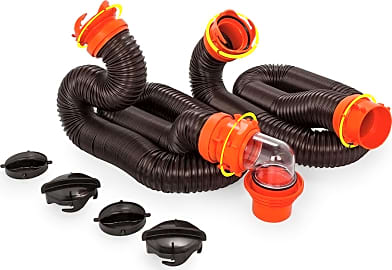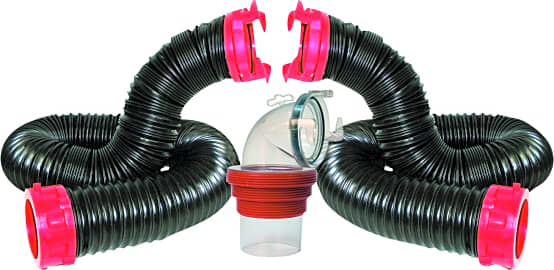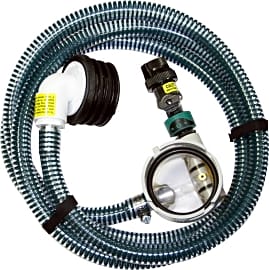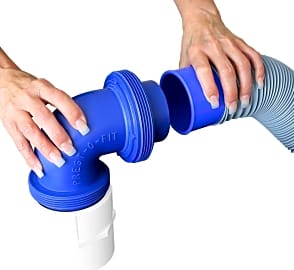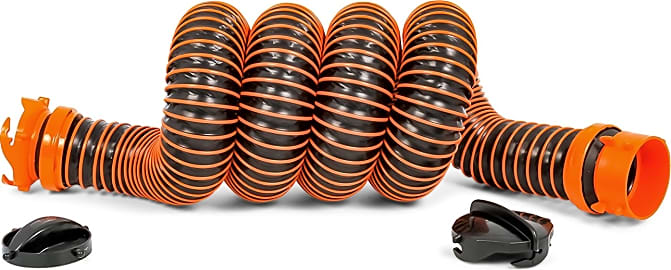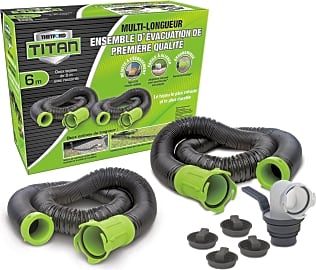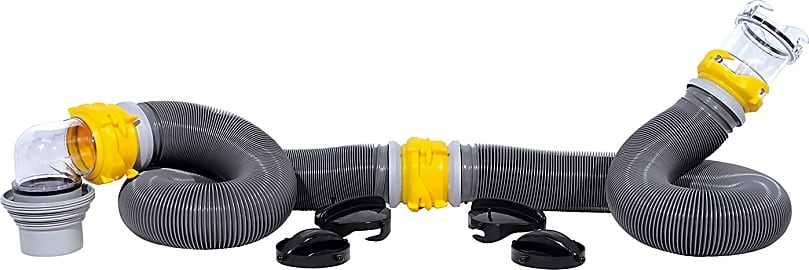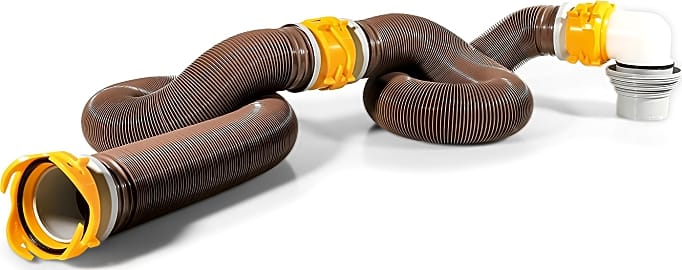The 9 Best Sewer Hose Kits

This wiki has been updated 35 times since it was first published in February of 2017. Removing waste from an RV, boat, or trailer isn't anyone's idea of fun, but a top-quality sewer hose kit can make the task of emptying your gray and black water tanks a lot less odious. The options in our selection are quick and easy to hook up, odor- and leak-resistant, and designed to last, so you can get the job done with minimal fuss. Just make sure that you only dump at approved sites. When users buy our independently chosen editorial choices, we may earn commissions to help fund the Wiki.
Editor's Notes
March 19, 2021:
Having a flushable toilet in your RV or camper is a luxury that most people can appreciate, however, at some point it will need to be emptied, and to do so a good quality hose is a necessary piece of equipment as it prevents spillage and drips. Whether you are looking for an upgrade or replacing a broken system, one of these kits should provide you with all the necessary connectors and fittings to complete the task without causing a mess.
In this most recent update, we researched the current market, and our previous selections, and found that no changes are necessary at this time. By and large, these kits are composed of a flexible hose and either universal or specific connectors, which are used to link the waste tank to the emptying facility, therefore, the durability of the hose and the watertight seal of the connectors are of primary importance. Beyond that, the extendable length of the hose and how compactly it stores away will likely be the next major consideration. The Camco Revolution Swivel, for example, has two hoses, providing either a 10- or 20-foot set up. It compresses down quite nicely too, however, its outer diameter and the width of connectors make it a little too big to fit into many bumper storage boxes. The Camco Deluxe 39658, on the other hand, compresses down to a mere 24 inches, making it a good choice for smaller RVs and frequent travelers. The Camco RhinoExtreme RV is a very durable option that is reinforced with steel wire, making it resistant to crushing. It comes with a transparent elbow, so you can easily see when the tank is empty, and a 4-in-1 dump station fitting for a variety of different diameter connectors. The Prest-O-Fit Blueline is notable as it uses push-fit connectors that stay in place using friction. This may sound like an accident waiting to happen, but well-designed and well-made parts make it highly resistant to leaks, and it can certainly save time when assembling the system.
September 04, 2019:
There's no way to overstate the importance of a reliable sewer line, as anyone who's even been splashed with a few day's worth of waste can definitely tell you. In assembling a list of these hose kits, we wanted to make sure that all connection points were as solid as possible, and that the material construction of the hoses themselves were as durable as possible. That's why we had to send the Valterra Viper packing, as its hose proved to be a little too thin. Early applications weren't the issue here so much as long term use, as small tears in the sides of the hose could easily result in leaks. And even small leaks when dealing with sewage are a big deal.
In reorganizing the list to reflect our continued evaluation of these products, the Lippert Management System rose to the top thanks to an excellent valve system that's both easy to use and reliable. It wont slip open on you from small bumps and jostles, and when you close it, it closes securely. And don't let the narrow diameter of the Valterra system at number four fool you; it's designed to pulverize solid waste as it drains from your tank, so as long as your kids don't accidentally flush any toy cars down the toilet, it will work rather well.
Special Honors
RV Upgrades You may need specialized adapters and fittings to ensure a watertight coupling to your sanitation system. RV Upgrades stock a wide variety of adapters and fittings, allowing you to connect your new hose kit with confidence. rvupgradestore.com
Slunky If you need to stretch your hose over uneven or rough ground, then a support cradle will prevent damage and ensure a good flow angle. This collapsible framework extends to 25-feet, is made from durable plastic, and has a self-fastening strap for storage. unitedrv.com
A Brief History Of Portable Plumbing
An RV toilet also employs a flap-valve to keep sewer gases from backing up into the coach, with a rooftop vent to let them escape harmlessly.
Spend any time in an RV, and you’re likely to learn more than you’ve ever hoped to know about sanitation, not to mention your fellow travelers’ bodily functions. Traveling with a shy bladder or a fussy colon? Prepare to be mortified. If your rig’s gas leak alarm is among the highly sensitive ones that respond to the aroma of fresh farts, you may want to travel with a dog so you can blame Fido when it goes off. Heaven forbid, you should have a bowel movement while staying at a busy RV park. The alarm starts wailing, you flush and scramble to silence the stupid thing, and suddenly everyone around you is well aware that you’re holding up your pants and flailing frantically at an errant gas alarm. Or so I’ve been told…
Intestinal dramas aside, the fact remains that when you’ve gotta go, you’ve gotta go, and going in an RV necessarily involves dealing with the aftermath in ways you’re unlikely to confront in sticks-and-bricks accommodations. That’s where the much-maligned but absolutely vital black tank and sewer hose kit come in. Whether you’re boondocking in the middle of nowhere, parked in a relative’s driveway, staying a few days at a state park with a dump station, or vacationing at a swanky private park with full hookups, you’ll have to give careful consideration to your plumbing facilities, capacity, and upkeep.
Modern portable toilets and their associated plumbing are generally based on the chamber pots and water closets of the late 18th and early 19th centuries. Like their present-day porcelain cousins, toilets designed for RV camping use a flushing mechanism developed by the erstwhile innovator Mr. Thomas Crapper, whose ingenious solution for cleaning out toilet bowls immortalized him in the most ignominious fashion imaginable. The primary difference between these descendants of the original crapper is in the materials used for inflow, output, and collection. In an RV or porta-potty, PVC and other lightweight materials stand in for the heavier stoneware and metal fixtures used in permanent installations. An RV toilet also employs a flap-valve to keep sewer gases from backing up into the coach, with a rooftop vent to let them escape harmlessly.
Hooking Up: Why RVers Don't Do It In The Dark
Don’t kid yourself that any of the above options will exempt you from dealing with the poop, pee, paper, or other products of one's daily constitutionals, which is to say nothing of all that gets washed down the sink and/or shower drain. The only way to avoid all that is to avail yourself of the nearest sticks-and-bricks facilities, unless, of course, you want to go au naturale in the wilderness, which is a whole other matter, and generally frowned upon in urban settings. Aside from that, if nature calls in full darkness, you may not want to take your chances with the local wildlife (any sound with the remotest possibility of coming from a predator on the prowl could very well scare the crap out of you, in which case you’ve got a different cleanup to deal with, assuming you survive the encounter with whatever went bump in the night). And arachnophobics, beware: spiders love to lurk in dimly-lit public facilities, so you can either master the mysteries of the storied black tank, or curse a bladder that insists upon being relieved at 3 a.m.
Whenever you use the onboard facilities, you’ll make a deposit into your rig’s waste collection system. Even the largest ones will only hold a few days’ worth of pooping, peeing, wiping, washing and the like, all of which must be emptied into a public waste management system. When you’re boondocking in the wild or dry-camping in an urban setting, that means finding a dumping station, and probably paying a modest fee for the privilege of trying to look nonchalant to any passersby while braving the elements and dealing with the effluent. In some campgrounds, it’s a matter of timing your visits to the dump site to avoid queueing up with everyone else whose tanks are full. And even if you’re staying at the aforementioned swanky private park, you’ve got to connect your rig to the hookups when you get there, and make a tidy exit when it’s time for departure. Common courtesy and good sense dictates that you shouldn’t be doing either after dark, especially if you hope to be welcome there in future.
When Good Hoses Go Bad — A Possum's Tale
Speaking of hooking up in darkness, anyone who’s spent much time road-tripping in an RV can almost certainly raise the hairs on the back of your neck with accounts of their nighttime misadventures. As if maneuvering a giant vehicle on narrow and uneven roads with uncertain overhead clearances weren’t tricky enough in daytime, it gets even scarier when the sun goes down. And that’s just until you get where you’re going. Once you reach your destination, you still have to negotiate the entrance and site selection process — which can be pretty confounding after hours — find your spot, and wrangle your rig into the appropriate setup without disrupting your fellow campers’ proceedings (or local wildlife, as the case may be).
If you’ve done the job right, all will be well come morning, right? Not so much. Just ask the full-time RVer who awoke to find a peppering of possum-toothed holes in a brand-new sewer hose, the critter presumably having been attracted by the steak-scented dishwater from the previous night’s dinner. Or the one who found himself standing ankle-deep in shower runoff, an undiscovered clog in the line having backed everything up. And let’s not contemplate the embarrassment of explaining to an irate park official why you’re irrigating the grounds with untreated human waste, if some problem should crop up unbeknownst to you. So, for goodness’s sake, invest in a good-quality sewer hose and adapter kit for your rig. Maybe two. Just in case there’s a hungry possum lurking outside.


